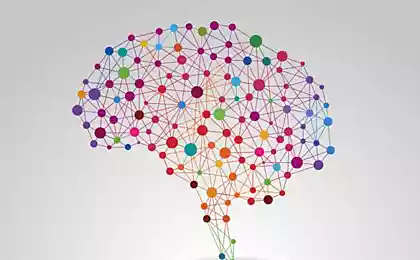491
Daniel Golman: business and emotional intelligence
Emotional intelligence determines how we are able to learn practical skills that are based on five components: self-awareness, motivation, self-regulation, empathy and skill to maintain a relationship. Our emotional competence shows how good we transformed this potential into skills required on the job. For example, the ability to serve customers is an emotional competence based on empathy. Similarly, trustworthiness is a competence based on self-regulation or the ability to fully cope with their impulses and emotions.

A particularly important role emotional competence plays in the leadership — the quality, the essence of which is the ability to get other people to do their job more efficiently. Leaders ' inability to maintain interpersonal relationships reduces the performance of all group members. It leads to wasted time, creates the atmosphere of conflict, undermines the motivation and commitment to the work, to provoke hostility and indifference.
A measure of the strength or weakness of emotional competence of a leader is the degree of the ability to maximize the talents of the people that he leads. Possession of a situation related to the expression of emotions requires the ability to resolve the conflicts: the ability to quickly inspire trust, to achieve mutual understanding, to carefully listen to, arguments to convince and persuade the interlocutor to the adoption of the Council. You need these abilities as self-awareness, understanding the perspective of other people, a sense of presence. And then for negotiations you will be that person that everyone is ready to trust.
Take the example of the best
Between successful and unsuccessful leaders clearly are some differences.
Self-control: the insolvent bad coped with difficult situations, it is easy to succumb to mood swings and was prone to outbursts of anger. Lucky, on the contrary, when any stresses are well controlled, remaining calm, self-confident and also reliable in the most critical moments.
Commitment: group insolvent reacted to criticism or failure a transition to defense, starting to deny it, to get out or blame others. Successful, taking responsibility, recognize their own mistakes and failures and take some actions to solve the problems. They always go forward, not dwell on their mistakes.
Reliability: the losers, as a rule, were overly ambitious and did not hesitate to forge ahead at the expense of others. Lucky was remarkable for honesty, showed constant care for the needs of their subordinates and colleagues, was diligently taken for the performance of urgent tasks. And all this gave a clear preference, instead of any way to impress his boss.
Social skills: the losers lacked empathy and sensitivity, so they are more likely to have been harsh or inconsiderate, instilling fear subordinates. And although if required, they could position themselves to interlocutors, showing concern for the Affairs of others, it was evident that the fascination for them — a means to manipulate others. Lucky was not to occupy empathy and sensitivity, they showed tact and attention, immersed in the Affairs of other people, whether superiors or subordinates.
Linkages and use of the otherness of people as a means to achieve the goal: insensitivity and manipulative demeanor of a group of losers turned around the inability to create a reliable system of relations of mutually beneficial cooperation. Lucky, better realizing the value of otherness, is able to get along with different people.
Develop your intuition
Heads of lending departments need to anticipate possible deterioration, even if with the numbers until everything is in order. Administrators have to decide in advance whether new products costs time and money necessary for its development.
The chiefs should be able to take a balanced approach to the question of who of the candidates for a specific job in its warehouse character perfectly adapt to the working group. Such situations require the ability to include in the decision-making process intuitive feeling in search of an answer to the question of what is right and what is not.
SUCCESSFUL MANAGERS WERE DISTINGUISHED BY HONESTY, TOOK CARE OF THE NEEDS OF THEIR SUBORDINATES AND COLLEAGUES
Intuition and interior sense demonstrate the ability to perceive signals from the internal store of emotional memory — our own source of wisdom and prudence of man. This ability is the true essence of identity. Emotional awareness starts with the configuration of the stream of feelings will be always present in each of us. From this moment, we recognize such emotions the ability to shape what we perceive, what they think and what we do.
This awareness helps you to understand that our feelings affect those with whom we are dealing. Financial advisors, it becomes clear that their own emotions in dealing with customers can spread to them, causing better or worse results.
Set aside the case
Our feelings are always with us, but we barely listen to him. We usually learn about their emotions, only when they grow and finally go out of control. But if we are attentive, we can sense their more subtle levels long before the moment they would emerge with such force.
Emotions have their own program and schedule. But in our hectic life it is not much space or air time — and that is why they go underground. All this intense mental-mental activity drowns out the quieter inner voice that offers guided inner resources of confidence, is able to keep us afloat in the ocean of life.
But self-awareness can be cultivated. Edward Douglas, a former CEO of Silicon Graphics, said, "In our industry very often it happens that time to think is not at all. You have to do all the preliminary work, and then you have to rely on intuition, not allowing the mind to interfere in this process." As McCracken was able to learn how to use your intuition? He meditate about it daily for 10 years.
His approach can be called the time-honored way to hear your own inner voice — is deeply hidden, subtle: stop to "do nothing". Useful "doing nothing" — not a banal opportunity to shirk work. This is a valuable ability to stop killing time, wasting it in vain, say, sitting at the TV or worse yet doing some thing to the accompaniment of a running TV. Just need to set aside for the time all other types of purposeful activities and to do things that will open our minds to a deeper and more peaceful perception.
Learn to adapt
Many managers are easy to adapt to new trends — the diffusion of responsibility and decision-making for the organization as a whole. So if in our days and there is some kind of popular competence is of course adaptability.
Champions in this area enjoy the change and enjoy the innovations. They are receptive to new information and can abandon old ideas, to adapt in a similar way to the way to proceed. They get along well with the feeling of anxiety, which often causes the new or the unknown, and willing to take risks, moving to new methods of operation.
Adaptability requires flexibility to be able to take into account different points of view on the situation. And flexibility, in turn, is directly connected with emotional power, i.e. the ability to feel comfortable with uncertainty and to remain calm when meeting with the unexpected. Another competency, which is the basis of adaptability is self-confidence, and this belief helps a person to quickly reconfigure your response, implicitly throwing all in a situation when changing the reality.
Don't be afraid of adventures
Emotional incentive of the innovator to action is the desire to find pleasure in novelty. People with such professional skill are able to quickly identify key tasks and simplify issues that sometimes seem extremely difficult. They are able to find the original link, and charts that others usually don't pay attention.
Deficiency of this competence can mean more than a simple lack of imagination. People who have the risk of causing discomfort, turn into critics and deniers. Careful, occupying a defensive position, they may constantly ridicule or undermine progressive ideas.
IN THE PRIVATE SPHERE TOO MUCH RESTRAINT PORTENDS FAILURE
The creative mind is by nature slightly unruly. Between the organized self-control and aspiration to innovation there is a natural tension. Not that creative people are not possessed by emotions... No, more correct to say that they are willing to give in to the most different impulses and commit more actions than nature, less prone to adventurism. In the end, this generates new opportunities. Self-control in terms of compliance with the rules portends outstanding results, larger organizations, especially those where welcomed to a bureaucratic approach to the proper performance of duties. But in the private sphere or in creative professions like advertising too much restraint portends failure.
Develop the skill of emotional presence
Emotionally present at work, people are full attention and are completely absorbed in their work — and therefore work, not sparing forces. They fully realize their creative ideas, energy and intuitive representation for the common good. Surrounding perceive them as people, available for dialogue and enthusiastic about their work.
The opposite position — the psychological no — too well known for example, those people who do their routine work mechanically, with the obvious boredom or something apart. In a sense, they may not found yourself in your profession.
Presence requires a person to "not disabling anxiety to have it opened and not closed from the other," explained William Kahn, a psychologist at the faculty of management at Boston University. Such a presence is the main attribute of the flow of inspiration: full attention or immersion in directly fulfilling the task.
On the contrary, the enemies of presence (and the flow of inspiration) are two of the same type of affliction, apathy and anxiety. Fully present in any given situation, we are focusing more on the people around us and the demands of the moment, and therefore can easily adapt to these requirements, in other words — get into jet. We can be considerate, funny or self-deprecating, freely using any ability or skill that we need at the moment. published
© Daniel Golman, Psychologist, science journalist, twice winner of the Pulitzer prize
P. S. And remember, just changing your mind — together we change the world! ©
Source: www.facebook.com/shabshaiefim/posts/1474547012866320:0

A particularly important role emotional competence plays in the leadership — the quality, the essence of which is the ability to get other people to do their job more efficiently. Leaders ' inability to maintain interpersonal relationships reduces the performance of all group members. It leads to wasted time, creates the atmosphere of conflict, undermines the motivation and commitment to the work, to provoke hostility and indifference.
A measure of the strength or weakness of emotional competence of a leader is the degree of the ability to maximize the talents of the people that he leads. Possession of a situation related to the expression of emotions requires the ability to resolve the conflicts: the ability to quickly inspire trust, to achieve mutual understanding, to carefully listen to, arguments to convince and persuade the interlocutor to the adoption of the Council. You need these abilities as self-awareness, understanding the perspective of other people, a sense of presence. And then for negotiations you will be that person that everyone is ready to trust.
Take the example of the best
Between successful and unsuccessful leaders clearly are some differences.
Self-control: the insolvent bad coped with difficult situations, it is easy to succumb to mood swings and was prone to outbursts of anger. Lucky, on the contrary, when any stresses are well controlled, remaining calm, self-confident and also reliable in the most critical moments.
Commitment: group insolvent reacted to criticism or failure a transition to defense, starting to deny it, to get out or blame others. Successful, taking responsibility, recognize their own mistakes and failures and take some actions to solve the problems. They always go forward, not dwell on their mistakes.
Reliability: the losers, as a rule, were overly ambitious and did not hesitate to forge ahead at the expense of others. Lucky was remarkable for honesty, showed constant care for the needs of their subordinates and colleagues, was diligently taken for the performance of urgent tasks. And all this gave a clear preference, instead of any way to impress his boss.
Social skills: the losers lacked empathy and sensitivity, so they are more likely to have been harsh or inconsiderate, instilling fear subordinates. And although if required, they could position themselves to interlocutors, showing concern for the Affairs of others, it was evident that the fascination for them — a means to manipulate others. Lucky was not to occupy empathy and sensitivity, they showed tact and attention, immersed in the Affairs of other people, whether superiors or subordinates.
Linkages and use of the otherness of people as a means to achieve the goal: insensitivity and manipulative demeanor of a group of losers turned around the inability to create a reliable system of relations of mutually beneficial cooperation. Lucky, better realizing the value of otherness, is able to get along with different people.
Develop your intuition
Heads of lending departments need to anticipate possible deterioration, even if with the numbers until everything is in order. Administrators have to decide in advance whether new products costs time and money necessary for its development.
The chiefs should be able to take a balanced approach to the question of who of the candidates for a specific job in its warehouse character perfectly adapt to the working group. Such situations require the ability to include in the decision-making process intuitive feeling in search of an answer to the question of what is right and what is not.
SUCCESSFUL MANAGERS WERE DISTINGUISHED BY HONESTY, TOOK CARE OF THE NEEDS OF THEIR SUBORDINATES AND COLLEAGUES
Intuition and interior sense demonstrate the ability to perceive signals from the internal store of emotional memory — our own source of wisdom and prudence of man. This ability is the true essence of identity. Emotional awareness starts with the configuration of the stream of feelings will be always present in each of us. From this moment, we recognize such emotions the ability to shape what we perceive, what they think and what we do.
This awareness helps you to understand that our feelings affect those with whom we are dealing. Financial advisors, it becomes clear that their own emotions in dealing with customers can spread to them, causing better or worse results.
Set aside the case
Our feelings are always with us, but we barely listen to him. We usually learn about their emotions, only when they grow and finally go out of control. But if we are attentive, we can sense their more subtle levels long before the moment they would emerge with such force.
Emotions have their own program and schedule. But in our hectic life it is not much space or air time — and that is why they go underground. All this intense mental-mental activity drowns out the quieter inner voice that offers guided inner resources of confidence, is able to keep us afloat in the ocean of life.
But self-awareness can be cultivated. Edward Douglas, a former CEO of Silicon Graphics, said, "In our industry very often it happens that time to think is not at all. You have to do all the preliminary work, and then you have to rely on intuition, not allowing the mind to interfere in this process." As McCracken was able to learn how to use your intuition? He meditate about it daily for 10 years.
His approach can be called the time-honored way to hear your own inner voice — is deeply hidden, subtle: stop to "do nothing". Useful "doing nothing" — not a banal opportunity to shirk work. This is a valuable ability to stop killing time, wasting it in vain, say, sitting at the TV or worse yet doing some thing to the accompaniment of a running TV. Just need to set aside for the time all other types of purposeful activities and to do things that will open our minds to a deeper and more peaceful perception.
Learn to adapt
Many managers are easy to adapt to new trends — the diffusion of responsibility and decision-making for the organization as a whole. So if in our days and there is some kind of popular competence is of course adaptability.
Champions in this area enjoy the change and enjoy the innovations. They are receptive to new information and can abandon old ideas, to adapt in a similar way to the way to proceed. They get along well with the feeling of anxiety, which often causes the new or the unknown, and willing to take risks, moving to new methods of operation.
Adaptability requires flexibility to be able to take into account different points of view on the situation. And flexibility, in turn, is directly connected with emotional power, i.e. the ability to feel comfortable with uncertainty and to remain calm when meeting with the unexpected. Another competency, which is the basis of adaptability is self-confidence, and this belief helps a person to quickly reconfigure your response, implicitly throwing all in a situation when changing the reality.
Don't be afraid of adventures
Emotional incentive of the innovator to action is the desire to find pleasure in novelty. People with such professional skill are able to quickly identify key tasks and simplify issues that sometimes seem extremely difficult. They are able to find the original link, and charts that others usually don't pay attention.
Deficiency of this competence can mean more than a simple lack of imagination. People who have the risk of causing discomfort, turn into critics and deniers. Careful, occupying a defensive position, they may constantly ridicule or undermine progressive ideas.
IN THE PRIVATE SPHERE TOO MUCH RESTRAINT PORTENDS FAILURE
The creative mind is by nature slightly unruly. Between the organized self-control and aspiration to innovation there is a natural tension. Not that creative people are not possessed by emotions... No, more correct to say that they are willing to give in to the most different impulses and commit more actions than nature, less prone to adventurism. In the end, this generates new opportunities. Self-control in terms of compliance with the rules portends outstanding results, larger organizations, especially those where welcomed to a bureaucratic approach to the proper performance of duties. But in the private sphere or in creative professions like advertising too much restraint portends failure.
Develop the skill of emotional presence
Emotionally present at work, people are full attention and are completely absorbed in their work — and therefore work, not sparing forces. They fully realize their creative ideas, energy and intuitive representation for the common good. Surrounding perceive them as people, available for dialogue and enthusiastic about their work.
The opposite position — the psychological no — too well known for example, those people who do their routine work mechanically, with the obvious boredom or something apart. In a sense, they may not found yourself in your profession.
Presence requires a person to "not disabling anxiety to have it opened and not closed from the other," explained William Kahn, a psychologist at the faculty of management at Boston University. Such a presence is the main attribute of the flow of inspiration: full attention or immersion in directly fulfilling the task.
On the contrary, the enemies of presence (and the flow of inspiration) are two of the same type of affliction, apathy and anxiety. Fully present in any given situation, we are focusing more on the people around us and the demands of the moment, and therefore can easily adapt to these requirements, in other words — get into jet. We can be considerate, funny or self-deprecating, freely using any ability or skill that we need at the moment. published
© Daniel Golman, Psychologist, science journalist, twice winner of the Pulitzer prize
P. S. And remember, just changing your mind — together we change the world! ©
Source: www.facebook.com/shabshaiefim/posts/1474547012866320:0
Have you already received your inventory number from Google?
How to successfully combine colors in the interior























